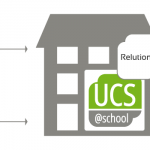The district of Harz as a school authority recognized early, that a school has different needs than the public administration. Therefore the school IT is separated from the IT structure of the administrative district. Our structures enable us to remain flexible and to respond to the individual needs of the schools. A special school needs other applications and end devices than a grammar school. Nevertheless, both systems must be manageable and functional.
Maintaining the Individuality of Each School Must Be a Basic Requirement.
Before we developed our first concepts, we visited each school and held individual discussions. Some schools already had very specific ideas, others had great concerns about digitization. Without knowing all the possibilities, no concepts could be created. So we started to bring all interested heads of schools and teachers together at regular intervals to discuss different approaches and technical solutions. It very quickly became apparent that closed systems could not meet our needs. No matter whether Windows cabinet, Macbook, a notebook with Linux, a Raspberry Pi or a tablet with iOS and Android. The use of all devices must be possible in a modern school. I see our task as school IT in making this possible via an open-source identity management system. This is the only way to get access to own data and services with a user account (identity of students and teachers), no matter on which system.
School concepts change. We as a school authority must remain flexible and enable the school to fulfil the curriculum. New ideas should never be excluded, but discussed and implemented together. We are currently testing different open-soure systems. The basic structure does not limit us. Through open systems the end user has the free choice. In our opinion, basic skills should be taught in class and not product training for individual manufacturers.
With open-source software, anyone interested can view the functionality of the software and adapt it to their needs. There are no license fees, but as with closed software, maintenance and operating costs are also incurred. The possibility to adapt software prevents the user from permanently binding himself to one manufacturer. The Internet, for example, is almost exclusively based on open software. The openness enables an exchange with other interested parties and everyone can benefit from the knowledge gained. Cooperation with other institutions is only partly possible in this way.

Schools in the District of Kassel: Managing iPads Centrally With UCS@school
In the district of Kassel, our team of 12 is responsible for the IT support of a total of 72 schools (49 elementary schools, 14 high schools, 3 grammar schools, 2 vocational schools, and 4 special needs schools) and around 27,000 user accounts (approx. 25,000 pupils and 2,000 faculty members). We take care not only of the hardware … read more

Like all school authorities, we demand an educational concept from every school. These concepts often reflect the need to use the USB ports of the end devices used, for example to program single-board computers (e.g. Calliope Mini) or for the uncomplicated exchange of data via a USB stick. We see it as a natural sign of mutual appreciation and work to meet these needs.
The district of Harz is a member of the professional network for digitally networked learning. We share our knowledge from the specialized network very gladly with all interested persons.
